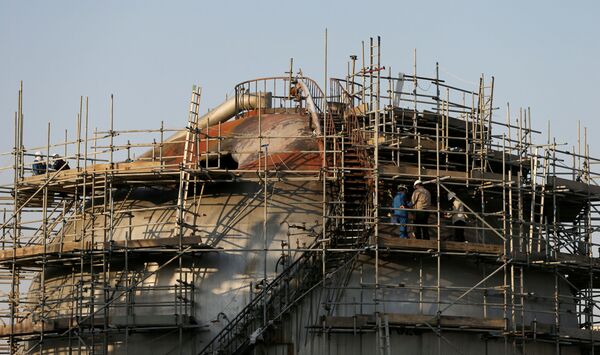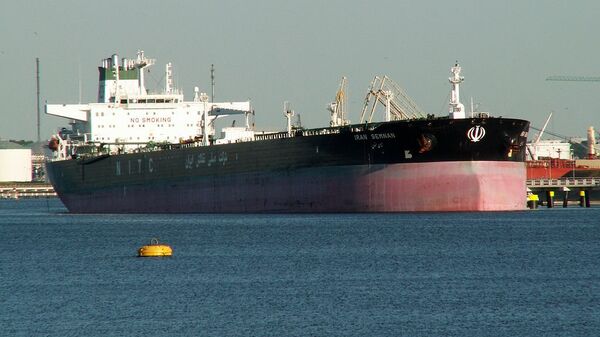Iran will not bow to US pressure, and will strive to use every possible way to export its oil, the Iranian Oil Ministry’s website SHANA quoted Oil Minister Bijan Zanganeh as saying.
“We will use every possible way to export our oil and we will not succumb to America’s pressure because exporting oil is Iran’s legitimate right,” said Zanganeh.
Emphasising that Washington’s increasing pressure on Tehran has scared away foreign investors from doing business in the country, SHANA quoted the Oil Minister as saying:
“China’s CNPC has totally pulled out of the South Pars Phase 11 development and Iran’s Petropars company will carry out the job.”
Last year, CNPC replaced French oil company Total as the operator of the Phase 11 project after the French company opted to pull out over US sanctions.
However, in response to US pressure, last year, CNPC also suspended investment in the field.
Zanganeh was also quoted as saying Iran wanted to improve ties with Arab countries in the Persian Gulf:
“We want to be friends with all regional countries ... they must not regard us as their enemy ... Our mutual enemy is outside the Middle East,” said the oil minister.
Against the backdrop of reports that Iran and Saudi Arabia have clashed at meetings of the Organisation of Petroleum Exporting Countries over oil output policies, with tensions further aggravated by the Saudi oil attack being blamed on Tehran, the oil minister said:
“We have no dispute with Saudi Arabia ... I have no problem to meet with Saudi Arabia’s oil minister.”
Tehran’s Export Project to Bypass Strait of Hormuz
International sanctions imposed on Iran have been a major obstacle on its road to becoming a major exporter of crude, prompting the country to search for ways to skirt them, with exporting from outside the Persian Gulf presenting an option.
Iran's oil minister, Bijan Zangeneh, said in late September that the country was building a 1,000-kilometre onshore pipeline from the Goreh oil terminal in southern Bushehr Province to the terminal at Jask, a port east of the Strait of Hormuz in the Gulf of Oman.
Thus, Iranian tankers will not need to go through the Strait of Hormuz upon the project's completion.
The Jask terminal is set to start exporting gas condensate from the South Pars field in 2020; oil exports are projected to begin by early 2021.
US-Iran Relations “Balancing on the Brink”
Relations plummeted between Iran and the US after President Donald Trump unilaterally withdrew his country from the 2015 Joint Comprehensive Plan of Action (JCPOA), otherwise known as the Iran nuclear deal, in May 2018, slapping Tehran with a series of tough banking and energy sanctions.
In response, Iran has gradually scaled back its own commitments to the 2015 nuclear deal.
Iran’s Atomic Energy Organisation (AEOI) reiterated on 6 October that the country would reduce its commitments under the deal further if the European parties to the pact did not meet promises to shield Iran’s economy from US sanctions.
“We will go ahead with our plans to decrease our commitments to the nuclear deal if other parties fail to keep their promises,” the Students News Agency ISNA quoted AEOI’s spokesman Behrouz Kamalvandi as saying.
In May 2019, the US dispatched a carrier strike group to the Middle East in a show of force, citing an unspecified Iranian “threat” to US interests in the region.
In the wake of that move, the Gulf of Oman and Strait of Hormuz witnessed a succession of volatile incidents, including tanker sabotage attacks and ship seizures; the United States and its allies have blamed Iran.
Tehran has consistently denied all accusations of involvement in the attacks.
A new low in Iran-US relations was registered after drone attacks targeted Saudi Arabia’s Aramco oil facilities on 14 September.
The incident, which resulted in a significant cut in oil production, was claimed by the rebel Yemeni Houthi movement.

Despite the claim, a number of countries, including Saudi Arabia itself, the US, the UK and Germany have blamed the attack on Tehran.
Iran cast aside all allegations of its complicity.
US President Donald Trump’s response to the incident involved introduction of more anti-Iranian sanctions, which were condemned by Iranian President Hassan Rohani in a speech at the UN General Assembly in New York as acts of “international piracy” and “merciless economic terrorism.”


